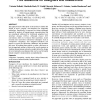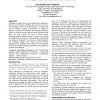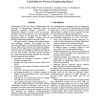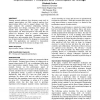296 search results - page 5 / 60 » Designing Innovative Learning Activities Using Ubiquitous Co... |
CHI
2002
ACM
14 years 6 months ago
2002
ACM
This paper borrows ideas from social science to inform the design of novel "sensing" user-interfaces for computing technology. Specifically, we present five design chall...
CHI
2003
ACM
14 years 6 months ago
2003
ACM
This paper considers how we may realize future ubiquitous domestic environments. Building upon previous work on how buildings evolve by Stewart Brand, we suggest the need to broad...
HICSS
2002
IEEE
13 years 10 months ago
2002
IEEE
In September of 1998, the College of Engineering at the University of Massachusetts Dartmouth piloted an innovative, integrated, first-year curriculum. It dramatically changed 31 ...
CIDM
2007
IEEE
13 years 6 months ago
2007
IEEE
— Detecting unknown worms is a challenging task. Extant solutions, such as anti-virus tools, rely mainly on prior explicit knowledge of specific worm signatures. As a result, aft...
CHI
2007
ACM
14 years 6 months ago
2007
ACM
Existing research addresses how designers create tools to support improvisation, yet little research explores how improvisation offers tools to support design work. This paper exp...




